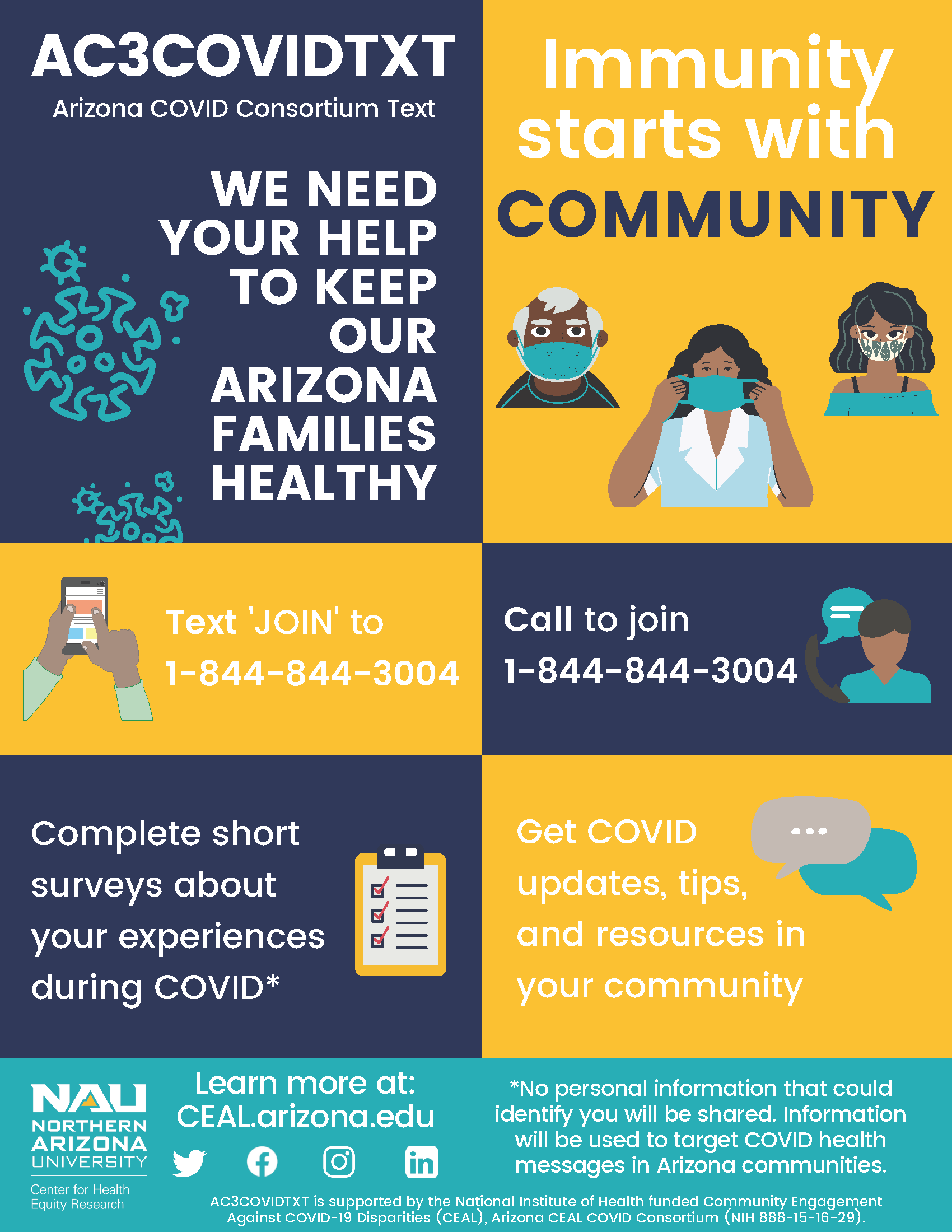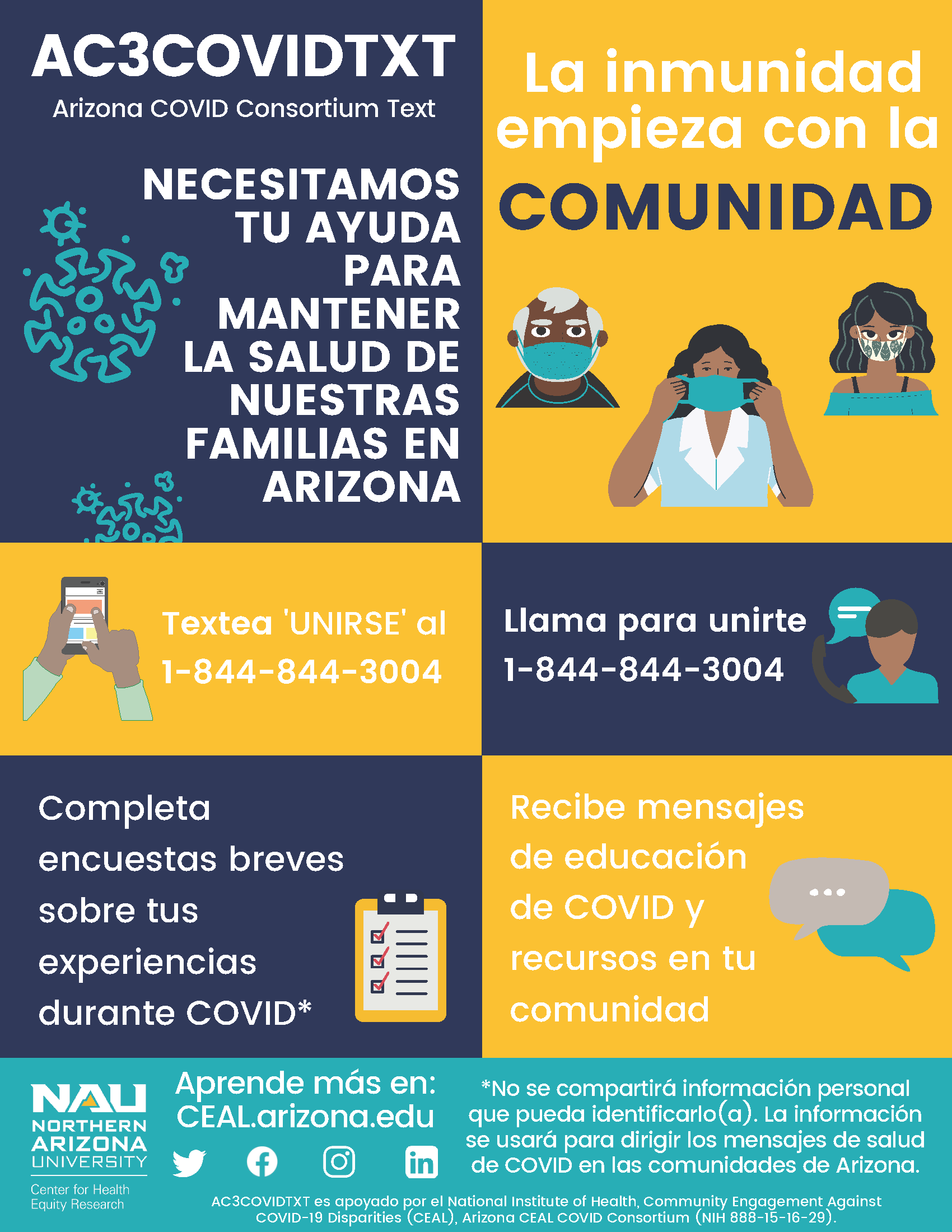NAU researchers expand COVID-19 education and outreach through key collaborations


According to Samantha Sabo, getting the COVID-19 vaccine to people who need it most requires a team approach with key experts in rural communities leading the way.
“Our work during the COVID-19 crisis is to make sure health equity extends to rural and ethno-racially diverse residents of northern Arizona who have been hardest hit by COVID-19,” said Sabo, an associate professor in Northern Arizona University’s Department of Health Sciences and the Center for Community Health and Engaged Research (CHER).
To accomplish their mission, Sabo and other NAU and CHER faculty successfully partnered with two main groups throughout the pandemic — the Arizona Community Health Worker Association (AzCHOW) and Arizona Community Health Representative Movement serving Native Nations in Arizona.
“Our intention is to focus all CHER COVID-19 prevention research efforts toward COVID vaccine access and other health equity issues in meaningful and coordinated ways,” Sabo said. “Community health workers are the links that bridge people to systems, and they have the expertise, respect and well-established relationships to lead the way in COVID-19 education.”
Arizona CEAL COVID Consortium (AC3): Promoting Health Equity during the COVID Pandemic
The three Arizona universities and the Mayo Clinic in Scottsdale formed the CEAL COVID Consortium (AC3) about nine months ago. Recently, the National Institutes of Health awarded the project an additional $1 million to expand the project and focus on vaccine barriers.
Sabo leads CEAL for NAU with NAU co-investigators Regents’ Professor Julie A. Baldwin, director of CHER; Nicolette Teufel-Shone, associate director of CHER and professor in Department of Health Sciences; Naomi Lee, assistant professor in the Department of Chemistry and Biochemistry; assistant professors Linnea Evans and Amanda Pollitt, Department of Health Sciences and CHER; Heather Williamson, associate professor in the Department of Occupational Therapy and CHER; and Joseph Mihaljevic, assistant professor of School of Informatics, Computing and Cyber Systems. Former and current NAU graduates, Dulce Jimenez, MPH, Omar Gomez, MPH and Esther Cadman, PhD, are the forces of nature behind rapid data collection, analysis and dissemination.
“We are always a couple steps behind with COVID-19, which is frustrating, but we are doing our best to turn data around as fast as possible to our county and tribal partners who have been serving our community for so many months now – its feels good to give back in this way,” said Jimenez.
The goal of AC3 is to conduct community-engaged research and outreach to increase COVID-19 awareness and education among communities of color disproportionately affected by COVID-19 and to reduce misinformation and mistrust among these populations through culturally relevant and safe messaging, and resource sharing.
AC3 CEAL TEXT initiative
Through the AC3 CEAL initiative, anyone can now text ‘JOIN’ to 1 (844) 844-3004 to enroll in the Arizona Consortium (AC3) text messaging initiative and start to complete brief surveys and receive weekly, science-based, plain language COVID-19 prevention messages and resources.
Through this system, AC3 surveys aim to learn about shifting experiences, concerns, attitudes, and needs around COVID-19 testing, vaccines, and prevention among Arizona’s hardest hit communities, including African American, Latino and American Indian residents.
And coming soon, AC3 will display these anonymous survey results by region through a public dashboard for leaders to use in decision making and planning.
For people without a smartphone or internet access, AC3 has established a call center using the same 1(844) 844-3004 number to answer questions, administer surveys, and provide information regarding COVID preventative practices including vaccines.
To learn how to promote AC3 TXT and data for your region, contact Dulce Jiménez at Dulce.Jimenez@nau.edu.
AzCHOW highlight on training
As part of AC3, AzCHOW trained more than 100 community health workers, community health representatives and community partners last month on COVID-19 vaccine information.
In April, AzCHOW has six COVID vaccine trainings scheduled in both English and Spanish. Attendees will learn about the types of vaccines, common myths, safety precautions, how to support clients interested in the getting the vaccine, and challenges community health workers are facing.
“CHWs, CHRs and promotoras throughout Arizona have participated in our trainings offered in English and Spanish,” said Ruby Meraz, AzCHOW Training Center director. “CHWs are using materials and trainings developed through CEAL and the AzCHOW Training Center to communicate the evidence clearly and with confidence so that everyone can understand and use it to prevent COVID-19.”
AzCHOW has also developed a training highlighting the impact of COVID on the lives of community members. Topics include mental health support, financial support, nutrition assistance, and employment challenges.
Soon they will launch a Train-the-Trainer Program that supports the CHW workforce to meet the needs of their community.
“As trusted members of communities across Arizona, CHWs know the barriers faced by rural people to get a vaccine, and for those folks still on the fence about the COVID vaccine, CHWs through their trusted relationships and evidence informed training can promote vaccine confidence in ways no one else can,” said Sabo.
For more information and to schedule training, contact Ruby Meraz at ruby@azchow.org.
Future project: COVID and youth leaders in rural schools
In the future, NAU CHER faculty and AzCHOW employees hope to partner with rural school districts to train older students to serve as peer educators on COVID-19, including protection measures, vaccine information and registration steps.
The goal of this partnership is to integrate the resources of NAU and AzCHOW in schools in rural communities by offering students an opportunity to get involved and serve communities that are often overlooked by state health care systems.
Additionally, the schools and student participants’ connection with the public health workforce and the university could support their educational plans and strengthen a path to higher education and employment. Contact Linnea Evans for more information at Linnea.Evans@nau.edu.
